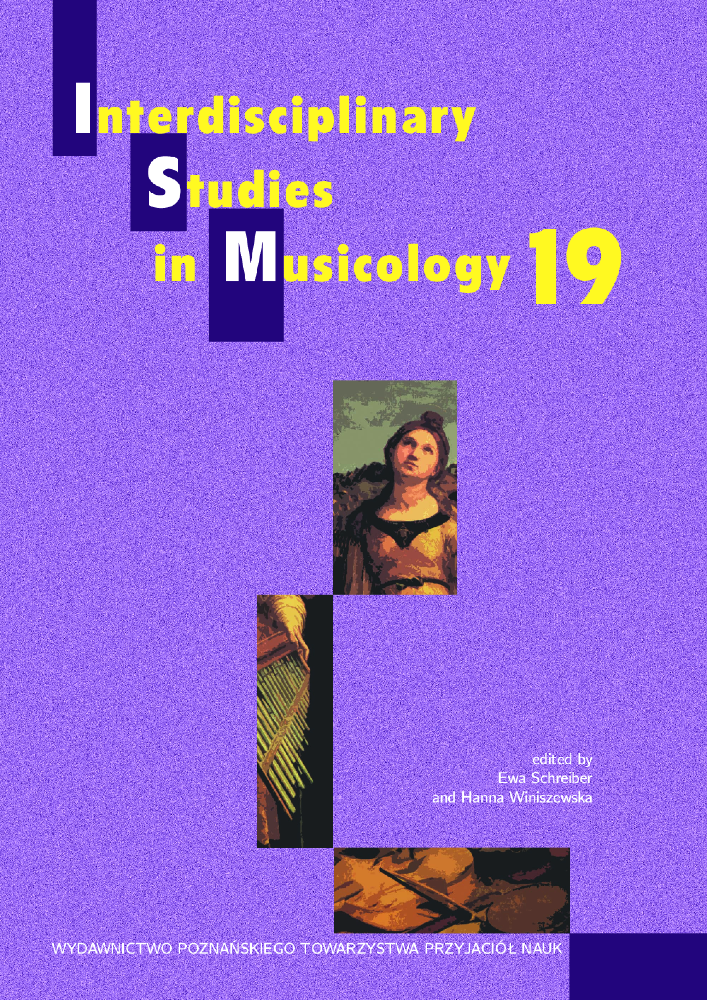Abstrakt
In her article titled Niebezpieczne związki, czyli o granicach wolności w sztuce i w życiu [Dangerous liaisons, or on the limits of freedom in art and life] Elżbieta Korolczuk (2013) claimsthat ‘the sense of personal freedom and independence from other people – not only in the senseof intellectual and aesthetic influences, but also familial and emotional ties – is often perceived asnecessary in order to create new, original works, to be a truly creative individual’. It is not difficult to find new and original works in the oeuvre of Karlheinz Stockhausen and Iannis Xenakis and,paraphrasing the words of Maria Anna Potocka (2013) – it is thanks to them that ‘the world has moderniseditself and freed itself from outdated values’. In relation to creative work in music, this ‘senseof personal freedom and independence from other people‘ leads, on the one hand, to the ‘freedom ofmusic’ and, on the other, ensures achieving ‘freedom in music’. The aim of this discussion is to pointto those threads in the statements of Stockhausen and Xenakis, and those features of their works,which testify to the specific manifestations of the ‚‘freedom in music’ created by them.
Bibliografia
Choong, K.-W. (1996). Iannis Xenakis and Elliott Carter: A Detailed Examination and Comparative Study of Their Early Output and Creativity. Brisbane: Griffith University.
Cott, J. (1974). Stockhausen. Conversations with the composer. London: Picador.
Hamel, P. M. (1995). Przez muzykę do samego siebie. [Through music to oneself] (P. Maculewicz,Trans.). Wrocław: Wydawnictwo Sartorius.
Humięcka-Jakubowska, J. (2013). Intuicja czy scjentyzm: Stockhausen – Ligeti – Nono – Berio– Xenakis – Grisey [Intuition or scientism: Stockhausen – Ligeti – Nono – Berio – Xenakis –Grisey]. Poznań: Wydawnictwo PTPN.
Iliescu, M. (1998). Xenakis i Thom. Problemy morfodynamiki dźwiękowej. [Xenakis and Thom.Problems of sound morphodynamics] Muzyka, 4(171), 87–108.
Korolczuk, E. (2013). Niebezpieczne związki, czyli o granicach wolności w sztuce i w życiu. [Dangerousliaisons, or on the limits of freedom in art and life] MOCAK Forum, 2. Retrieved from https://www.mocak.pl/niebezpieczne-zwiazki-czyli-o-granicach-wolnosci-w-sztuce-i-w-zyciu-elzbieta-korolczuk
Maconie, R. (1976). The Works of Karlheinz Stockhausen. London: Oxford University Press.
Maconie, R. (2005). Other Planets. The Music of Karlheinz Stockhausen. Lanham, Maryland, Toronto,Oxford: The Scarecrow Press.
Pasiecznik, M. (2011). Rytuał superformuły. Karlheinz Stockhausen:‘Licht. Die Sieben Tage derWoche’ [The ritual of superformula. Karlheinz Stockhausen: ‘Licht. Die Sieben Tage der Woche’].Warsaw: Wydawnictwo Krytyki Politycznej.
Pauli, H. (1975). Iannis Xenakis im Gespräch. Schweizerische Musikzeitung, 115, 300–08.
Peters, G., & Schreiber, M. (1999). ‘…How Creation is Composed’: Spirituality in the Music of KarlheinzStockhausen. Perspectives of New Music, 37(1), 97–131.
Potocka, A.M. (2013). Wolność w sztuce. [Freedom in art] MOCAK Forum, 2. Retrieved from https://www.mocak.pl/wolnosc-w-sztuce-maria-anna-potocka
Solomos, M. (2004). Xenakis’ Thought through his Writings. Journal of New Music Research, 33(2),125–136.
Solomos, M. (2011). Xenakis first composition in musique concrète: Diamorphoses. Retrieved from https://www.gold.ac.uk/media/documents-by-section/departments/music/Keynote-III-Makis-Solomos.pdf
Stockhausen, K. (1964). ‘Zeitmaße’. In D. Schnebel (Ed.). Texte: zu eigenen Werken, zur Kunst Anderer, Aktuelles, vol. 2:Aufsätze 1952–1963 zur musikalischen Praxis, (pp. 46–49). Köln: M. DuMont Schauberg-Verlag.
Stockhausen, K. (1964). ‘Zyklus’ für einen Schlagzeuger. In D. Schnebel (Ed.). Texte: zu eigenenWerken, zur Kunst Anderer, Aktuelles, vol. 2: Aufsätze 1952–1963 zur musikalischen Praxis,(pp. 73–100). Köln: M. DuMont Schauberg-Verlag.
Stockhausen, K. (1989). Texte zur Musik 1977–1984, vol. 6: Interpretationen. Köln: DuMont.
Stockhausen, K. (1998a). Freiheit – das Neue – das Geistig-Geistliche. Neue Zeitschrift für Musik, 4, 18–25.
Stockhausen, K. (1998b). Texte zur Musik 1984–1991, vol. 10: Astronische Musik, Echos von Echos.Kürten: Stockhausen-Verlag.
Stockhausen, K. (2001). We in music are like physicists – conversation with Julia Spinola on 11thSeptember 2001 in the Musikhaus for the FAZ, published on 17th September 2001.Retrieved from
https://pl.scribd.com/document/235211939/Stockhausen-PhysicistsToop, R. (2005). Six Lectures from the Stockhausen Courses Kürten 2002. Kürten: Stock-hausen-Verlag.
Varga, B. A. (1996). Conversations with Iannis Xenakis. London: Faber and Faber.
Xenakis, I. (1984). Musique et originalité. Phréatiques, 28, 62–66.
Xenakis, I. (1988a). Determinizm-indeterminizm. (M. Harley, Trans.). Warsaw: Polskie Towarzystwo Muzyki Współczesnej.
Xenakis, I. (1988b). Arts/Sciences: Alloys. Stuyvesant, NY: Pendragon Press.
Xenakis, I. (1992). Formalized Music. Thought and Mathematics in Composition. (Ch. Butchers,Trans.). New York: Pendragon Press.
Xenakis, I. (2008). Music and Architecture. (S. Kanach, Trans.). New York: Pendragon Press.

